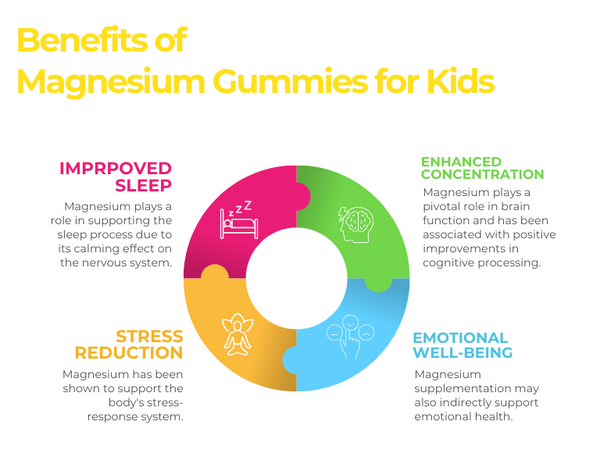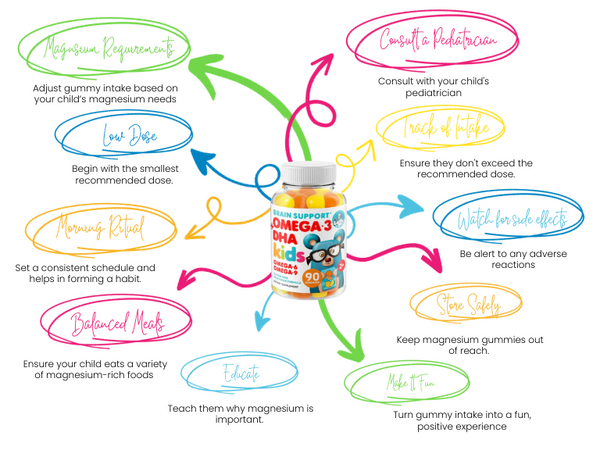Magnesium gummies offer a practical and enjoyable solution for ensuring your children receive essential nutrients necessary for their growth and development. This guide on kids magnesium gummies explores the benefits and explains how to seamlessly and safely incorporate them into your child's daily routine.
- Why Use Magnesium Gummies?
- Incorporating Kids Magnesium Gummies into Their Daily Routine
- Precautions When Incorporating Kids Magnesium Gummies
- Tips for Safe Supplement Use
- Dr. Moritz's Kids Magnesium Gummies
As parents, we strive to provide the best nutrition for our children. But let's face it, getting kids to eat healthily or swallow vitamins isn’t easy.

If you’ve tried, then you know they will turn their noses up at anything that remotely resembles something good for them. This is where magnesium gummies come in. These gummy supplements are not only packed with essential nutrients but also come in child-friendly flavors and fun shapes, making them a hassle-free solution to the nutritional needs of your little ones. Let's take a look at why magnesium gummies are a great option and how you can seamlessly incorporate them into your child's daily regimen.
Why Use Magnesium Gummies?

Magnesium is an important mineral for a child's growth and development, playing a critical role in over 300 biochemical reactions in the body, including bone health and energy production. However, ensuring your child gets enough magnesium through diet alone can be challenging, especially since primary sources of magnesium are green leafy vegetables, nuts and seeds, and whole grains. Magnesium gummies step in as a practical solution. They are designed to be palatable and enjoyable, which helps increase the likelihood of your child willingly taking their daily supplements.
Incorporating Kids Magnesium Gummies into Their Daily Routine
Understand Daily Magnesium Requirements: Familiarize yourself with the daily magnesium needs for children. Generally, children aged 1-3 years require about 80 mg, 4-8 years need about 130 mg, and 9-13 years need about 240 mg daily. Adjust the gummy intake accordingly.
Consult a Pediatrician: Before starting any supplement regimen, consult with your child's pediatrician, especially if your child has specific health concerns or dietary restrictions.
Start with a Low Dose: Begin with the smallest recommended dose to assess tolerance and gradually increase the required daily intake.
Make It a Morning Ritual: Incorporate magnesium gummy intake into your child's morning routine, perhaps with breakfast. This sets a consistent schedule and helps in forming a habit.
Pair with Balanced Meals: While gummies supplement magnesium intake, they should not replace a well-rounded diet. Ensure your child eats a variety of magnesium-rich foods like leafy greens, nuts, and whole grains.
Educate Your Child: Involve your child in the process. Teach them why magnesium is important and how the gummies help. Making them a part of the decision can encourage them to take their supplements willingly.
Keep Track of Intake: Maintain a chart or use a pill organizer to track your child's supplement intake, ensuring they don't exceed the recommended dose.
Watch for Allergies and Side Effects: Be alert to any adverse reactions, such as stomach upset or allergic responses. If you notice any unusual symptoms, consult your pediatrician immediately.
Store Safely: Keep magnesium gummies out of reach of children to prevent them from consuming too many, as they can resemble candy.
Create a Fun Experience: Turn gummy intake into a fun, positive experience. Praise your child for remembering to take their gummies and for being responsible about their health.
Precautions When Incorporating Kids Magnesium Gummies
Mixing certain supplements with magnesium can reduce the efficacy of either substance. Here are some supplements you should avoid mixing with magnesium and the reasons why:
Calcium and Magnesium
Why? Both calcium and magnesium compete for absorption in the intestines. Taking them together can reduce the absorption of both minerals, leading to deficiencies or reduced effectiveness.
What to Do: Take calcium and magnesium at different times of the day. We recommend taking magnesium in the morning and calcium in the evening or vice versa.
Iron and Magnesium
Why? Magnesium can interfere with the absorption of iron. If taken together, it may lead to decreased iron levels, potentially causing or exacerbating anemia.
What to Do: Take iron supplements at least two hours apart from magnesium supplements. This helps ensure better absorption of both minerals and reduces the risk of decreased iron levels.
Zinc and Magnesium
Why? Similar to calcium, zinc competes with magnesium for absorption. Taking high doses of zinc and magnesium together can impair the absorption of both minerals.
What to Do: Schedule zinc and magnesium supplements at different times of the day, preferably a few hours apart. This prevents competition for absorption and ensures both minerals are effectively utilized by the body.
Phosphate and Magnesium
Why? Magnesium can bind to phosphates, forming insoluble complexes that the body cannot absorb. This can lead to a decrease in the availability of both magnesium and phosphate.
What to Do: Be mindful of your diet and any phosphate-containing supplements to avoid the formation of insoluble complexes that hinder the absorption of both magnesium and phosphate. If you need both, consult with a healthcare provider to determine the best schedule.
Potassium and Magnesium
Why? Very high doses of both magnesium and potassium can cause an imbalance in electrolytes, potentially leading to cardiac issues, especially in individuals with kidney problems.
What to Do: Monitor your intake of both potassium and magnesium, especially if you are on high doses or have kidney issues. Consult with a healthcare provider before combining these supplements.
Tips for Safe Supplement Use
Timing Intake of Kids Magnesium Gummies Helps
The timing of supplement intake can affect their absorption and effectiveness. Certain minerals and supplements compete for absorption in the intestines, which can lead to reduced efficacy if taken simultaneously. If your child is also taking a multivitamin, be sure review the multivitamin's ingredients to see if it includes calcium, iron, zinc, or other minerals that might interact with magnesium.
Consult With a Trusted Physician Before Incorporating New Supplements For Your Kids
Consulting with a healthcare provider ensures that your supplement regimen is safe and tailored to your child's individual needs. Always talk to your healthcare provider before beginning any new supplement. Remember to ask specific guidance on the timing and dosage of supplements, especially if you are combining multiple supplements or medications.
Support Supplements With A Balanced Diet
Supplements are designed to fill in the gaps that your diet is not able to meet. Choose whole foods for your kids so they get a complex matrix of nutrients, fiber, and other beneficial compounds.
Dr. Moritz's Kids Magnesium Gummies
Magnesium gummies offer a practical and enjoyable way to ensure your child meets their daily nutritional requirements. By incorporating these supplements into your child's routine with mindfulness and consistency, you can promote their health and well-being while eliminating the struggle often associated with traditional vitamins. Remember, a balanced diet, regular consultation with a healthcare provider, and a fun, informed approach to supplementation are key to integrating magnesium gummies into your child's diet effectively.
Get more information on the benefits of kid magnesium gummies
Magnesium Gummies for Kids: The Comprehensive Guide for Parents


